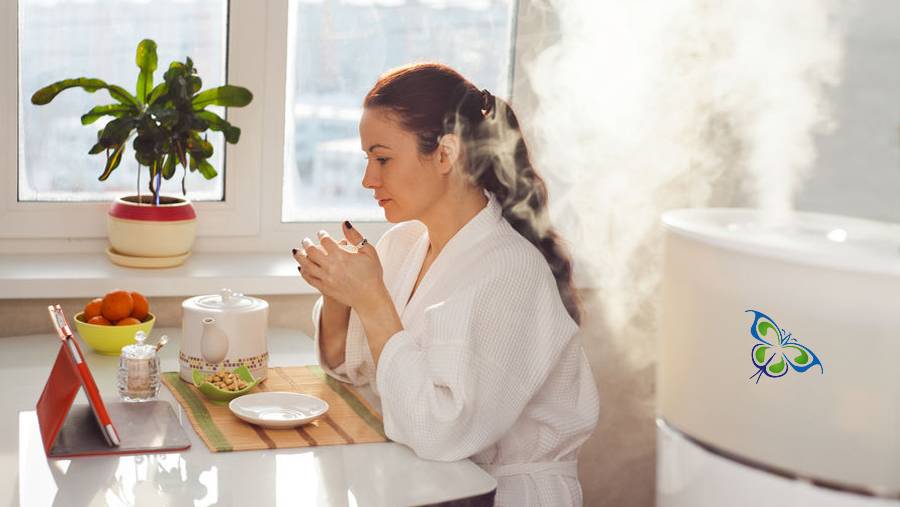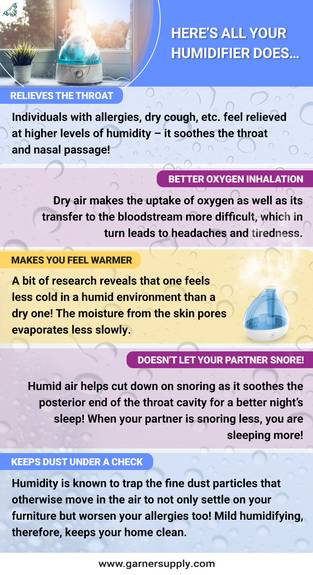
Hello
Select Address

Since my teens, I have been suffering from psoriasis, an autoimmune disorder that manifests on the skin and aggravates due to dryness. Most part of the year, especially winters and the onset of spring, there is marked dryness which causes psoriasis to flare up!
Dryness is a bane for people suffering from respiratory problems too. Lack of humidity flares up a lot of health issues, the most common ones being –
• Dry and/or bleeding nose
• Cracked lips
• Congestion of sinus and headache
• Dry cough along with irritated throat and vocal cords
The use and popularity of humidifiers have increased in an attempt to get relief from all these issues. Consequently, the concern that has grown over the years is: how does overuse of humidifiers impact the health of the household members? This article delves into a detailed study of the health impacts of humidifiers.
Things to remember while using one:
• Keep humidity levels in check. Too much moisture released may condense on the walls which could again be a breeding space for molds.
• Keep the humidifier clean as an unclean one might breed mold and bacteria
• Talk to your doctor before using them if you have asthma or other allergies
• Distilled water is safest in humidifiers as the tap water releases minerals and microorganisms (which are not necessarily harmful and lie in the form of dust on your furniture). Moreover, minerals create deposits inside the humidifier too.
• Change filters regularly, at least as often as the manufacturer recommends.
Humidifiers, therefore, pose several risks. Skin burn is one of the most common and fatal consequences of careless use of a humidifier. However, careful usage and proper cleaning can zero the risks easily.

Is cleaning humidifiers a big deal?
You might imagine that cleaning humidifiers are a big deal. No, it's not! It is easy and you can do it in minutes! Just keep these in mind -
• Cleaning can be done using a 3% hydrogen peroxide available at the medical stores. Some advice the use of chlorine and disinfectants too.
• Between uses rinse out all the water from the tanks and dry the inner surfaces too.
• After every 2-3 days of use, the bucket and filter system needs to be washed, which involves the removal of mineral deposits (using the above-mentioned chemicals).
• To clean and disinfect the unit, adhere to the manufacturer’s instructions strictly
Experts from across the globe have increasingly warned against the overuse of humidifiers. Since it has been regularly advised to keep humidity levels under control, what are the ideal moisture levels?
The recommended humidity levels for humidifiers
Ideally, the moisture level inside the home should remain somewhere between 30 and 50%. The final decision is yours depending upon your comfort requisites. The moisture content outside changes with change in season; set the humidifier such that there isn't too much variation when you frequently need to move in and out of the house! Both the 'too low' and 'too high' amounts are not at all advised.
A hygrometer helps you to determine the moisture level inside your home. Some humidifiers (like the central ones) are equipped with a hygrometer.
The pros...
Humidifiers, although not a treatment procedure, provide more than one health benefit. So, how does your humidifier improve your well-being?
• They reduce the chances of flu. This conclusion is the result of a study, where, the influenza virus was let out in the air and the humidity levels kept above 40%. The moisture cut down the activity of the virus making it less infectious!
• It reduces snoring too. Since moisture lubricates the airways the snoring noise is kept from worsening!
• Makes cough productive! A dry cough is non-productive, that is to say, a non-dry cough helps release the sticky phlegm.
Last but not the least, these units would be loved by your home-sweet-home too. Moisture-loving plants become lively, wooden floors and furniture last longer and your favorite wallpaper is saved from cracking!